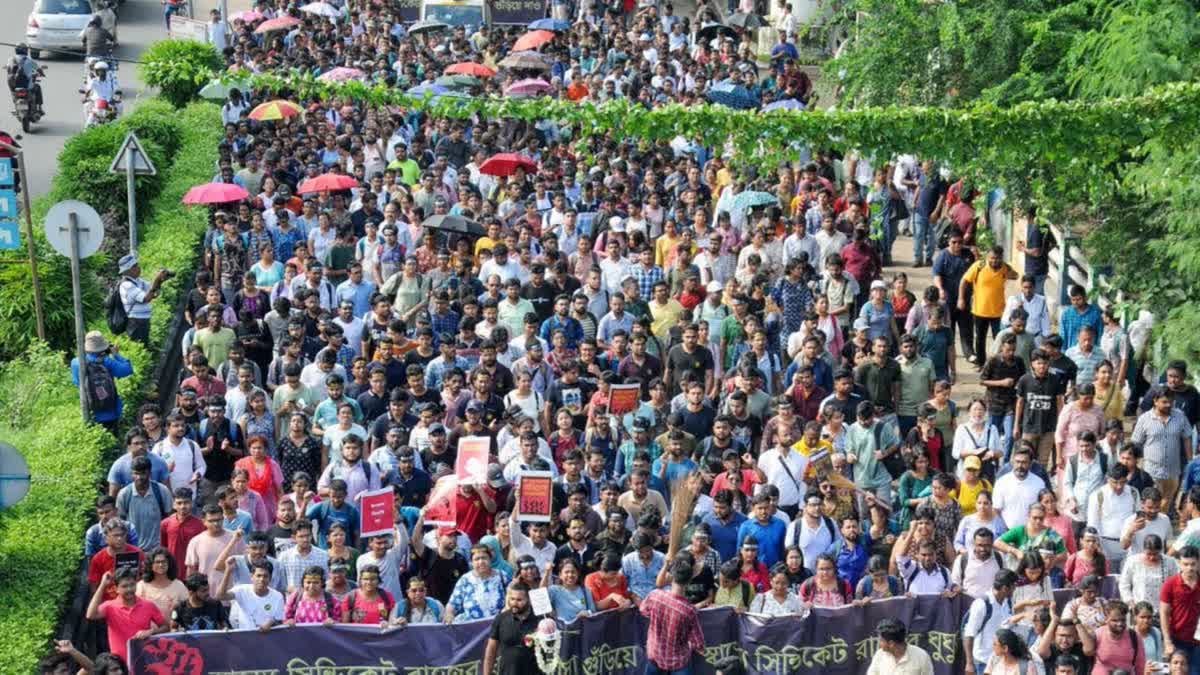New Delhi: The resident doctors have suggested for a standard working condition of 48-hour (workweek) along with a one workday off per week, when they met the representatives of the sub-groups of National Task Force (NTF) in New Delhi.
“We had a productive meeting with the DGHS, MOHFW officials, and the NTF subgroup focused on Revamping Working Conditions of Healthcare Professionals. We have also appealed to increase faculty posts, para medical staff, residents so that the entire working conditions of the healthcare professionals get improved,” said Dr Indra Sekhar, Senior Resident Doctor, AIIMS to ETV Bharat.
The first meeting of the sub group set up to look into the concerns of healthcare professionals took place on Friday evening. Dr Sekhar was present in this sub group meeting. He said that the doctors’ consensus was clear. “Residency is extremely hectic. We presented key requests, including 48-hour workweek (as per the old residency scheme), one workday off per week, post-24-hour shift rest, no more than 12 hours of continuous duty,” he said.
Dr Sekhar further said that they have suggested increasing funding to hire more healthcare professionals, from faculty to residents, and engage allied professionals such as phlebotomists.
“The officials agreed to consult other zones and reach a consensus to recommend the most feasible solutions,” said Dr Sekhar. It was also discussed to enhance the awareness, implementation, and adherence to the Sexual Harassment at the Workplace (Prevention, Prohibition, and Redressal) Act, 2013, he said.
Following recommendations of the National Task Force (NTF), the health ministry set up four theme based sub-groups to address the concerns highlighted and areas suggested by the Supreme Court after a post graduate student of Kolkata’s RG Kar Medical College and Hospital was raped and murdered.
Apart from a sub group of revamping working conditions of healthcare professionals, the other three groups include strengthening infrastructure of medical institutions, strengthening security systems in medical institutions and strengthening of legal framework across all states.
As per an order issued by the health ministry on September 5, the sub-groups may finalise their recommendations based on such interactions as well as inputs received from the State Governments and Medical institutions.
“The Sub-groups may give their recommendations along with an action plan to MoHFW in three weeks, which would then be placed before the NTF for finalisation within the timelines set by the Supreme Court,” the order stated. The suggestions forwarded by the representatives of the resident doctors during the first meeting of the NTF sub group assumes significance following the fact that the working condition and timing play a critical role for healthcare professionals.
A task force report of the National Medical Commission (NMC) has recently found an alarming rate of mental disorder among medical students.
The task force also suggested regulation of duty hours. The task force recommends, based on feasibility, resources, and relevance, that residents work not more than 74 hours per week, with no more than 24 hours at a stretch.
“This schedule includes one day off per week, one 24-hour duty, and 10-hour shifts for the remaining five days. It is also important for medical students to sleep at least 7-8 hours per day for optimal mental and physical health,” it said.
The task force further recommends that the Department Heads (HOD), faculty members, senior residents, and Junior Residents (JRs) can collaboratively plan duty hours and roster the duty into three shifts, or two shifts, or one shift based on human resource availability.
It said that strict adherence to the National Medical Commission (NMC) regulations for a weekly one-day off is crucial.
“Implementing these measures, where feasible, will help protect the health of medical students and improve patient safety. It is imperative to recognize that post-graduates and interns primarily serve educational purposes rather than filling gaps in healthcare staffing,” the report stated.
Read More



